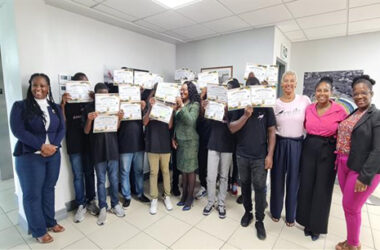THE National Reparations Committee (NRC) sparked-off its 10th Anniversary observances earlier this week, with the launch of a National Consultation on Reparations at the Castries City Hall.
The event, held to start a national discussion on the Caribbean Community (CARICOM) quest for Reparations from Europe for Slavery and Native Genocide in the region, was attended by members of the public, the NRC and the Castries Constituencies Council (CCC) and it featured questions and answers on various aspects of Reparations.
The consultation, also followed online by Saint Lucians at home and abroad through Live Streaming, heard special messages from Mayor Geraldine Lendor, as well as presentations by CCC Councilor Timothy James and President of the Caribbean Rastafari Organization (CRO) Bongo Wisely Tafari.
The consultation started with a special prayer by Bongo Wisely, in the Rastafari theocratic tradition, followed by the Madam Mayor’s message, read by Councilor Marius Modeste.
The mayor highlighted the central role played by City Hall (formerly Town Hall) throughout the council’s history, from colonialism to independence, as the city’s main center of public education.
She said she was proud that the council today is continuing that valuable historical tradition as a center for discussion of everything from the right to vote in 1951 to Statehood in 1967 and Independence in 1979.
The mayor also threw her and the council’s support behind the national consultation initiative, saying it was a necessary public discourse at this point. (See Mayor’s full address below)
NRC Chair, Earl Bousquet, said the discussions would go island-wide through all seventeen constituencies during 2024 and will feature the CARICOM’s 10-point Plan for Reparatory Justice and The Brattle Report — the latter a compilation of amounts estimated due by Europe, the USA and other beneficiaries from the Slave Trade as Reparations for the trans-Atlantic slave trade.
He said the consultation was also aimed at “offering opportunities for people to say what they feel about the Reparations being pursued in their name by CARICOM governments.”
Councilor James, who represented the CCC, noted that the consultation was preceded by a long period of “agitation for Reparations and Repatriation” by the Rastafarian community here and across the Caribbean, at a time “when it was not politically and intellectually palatable.”
He therefore called for “acknowledgment” of the sacrifices the pioneers of the movement suffered for their rightful beliefs.
The councilor nonetheless noted the new national, regional and international zest around Reparations globally today, but welcomed the late entry of politicians and intellectuals, “because in unity there is strength.”
Bongo Wisely, for his part, pointed-out that it’s “not only all about money,” but Reparations is also about “emancipating our minds” through a “self-healing” process that revisits the negative effects of colonialism on Caribbean minds during and after slavery.
He recalled that the enslaved in the Caribbean had proclaimed before 1834: “No emancipation without Reparations’ and called for “our true history” to be taught to today’s students.
The CRO President lamented that “History is no longer popular” at schools and urged that “all governments” start to fund NRC activities, especially as public education was entering the consultation phase.
The three-hour Question & Answer session addressed a wide range of subjects, from the speed of progress in the CARICOM bid, to the growth of the Reparations movement, what role for indigenous ‘native’ people, the self-repair process, expectations for repatriation, readiness of the continent to welcome Caribbean citizens as equals, roles of Religion, etc.
Noting that “The level of humanity imposed on us is empty,” Monsignor Dr Patrick Anthony offered closing remarks, saying, “This is a critical moment in our own history, when we can redefine our social values.”
He added “We have a special place in the history of civilization” and the monsignor invited Saint Lucians who haven’t, to “discover what it is like to be human.”
Bousquet says the NRC is “looking-forward” to working with other municipal bodies and communities in constituencies across the island” to facilitate the community consultations when they resume in January.
Meanwhile, the NRC is also planning other related anniversary activities before the end of November, including an online press conference on GIS/NTN next week, as well as a report on the NRC’s achievements in its first decade.
The NRC was established here in November 2013 under the Dr. Kenny D. Anthony administration, after the establishment in July of the CARICOM Reparations Commission (CRC), chaired by University of the West Indies (The UWI) Vice Chancellor, Sir Hilary Beckles.
Members of the Saint Lucia NRC are: Earl Bousquet (Chair), Monsignor Dr Patrick A. B. Anthony, Dame Pearlette Louisy (GGE), Ambassador to CARICOM and OECS Dr Elma Gene Isaac, Embert Charles (Author and Folk Researcher), Rhyesa Joseph (Monsignor Patrick Anthony Folk Research Center), Alexander Emmanuel (Archaeological and Historical Society), Leslie Crane-Mitchell (Head, UWI Global Campus Saint Lucia), Nkrumah Lucien (Lecturer and Historian), Yaniqueca Jean-Bart William (President, National Youth Council), Ethan Leandre (National Students Council), Claudia Sheppard (Iyanola Council for Advancement of Rastafari), Bongo Wisely Tafari (Caribbean Rastafari Organization) and Hon. Dr June Soomer, an original founding-member.





